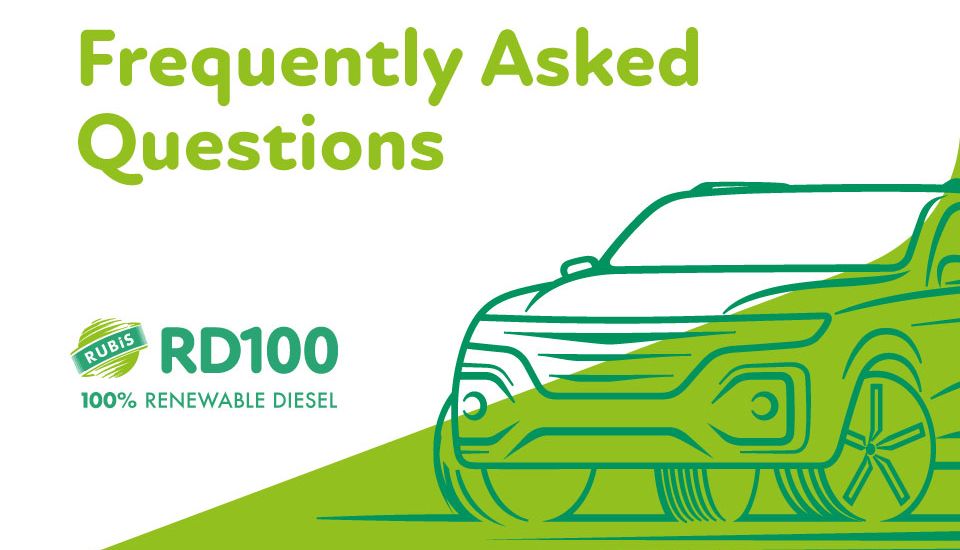

Rubis, the Channel Islands’ most forward-thinking fuel distributor, has launched an advanced biofuel, as an immediate solution towards Jersey’s objective to reduce carbon emissions.
After Scandinavia and Baltic countries, Jersey will become only the 11th country in the world to offer the new fuel, which is branded locally RD100.
Browse through the below FAQs to find answers to commonly raised questions. If you can't find the answer to your question view the full FAQ’s online at https://rubis-ci.co.uk/motor-and-aviation/rd100/rd100-faqs/ or write to Rubis at enquiries@rubis-ci.co.uk for further information or advice.
Q. I have a diesel vehicle, can I use RD100 now?
RD100 can be added to your tank now and drivers of diesel vehicles can start to reduce their emissions immediately. RD100 is fully compatible with the existing fuel distribution infrastructure. It can be used as 100% renewable diesel or blended with conventional diesel, which means you can put it in your tank now and there is no need for any modifications to your vehicle.
If you have any concerns, it is always worth speaking with your vehicle manufacturer.
Q. How will it help me make an impact on climate change globally?
RD100 will help reduce local traffic emissions, in particular with vans and trucks in town. This is especially beneficial when you consider most local drivers make short journeys and spend a lot of time in traffic congestion, especially at the start and end of the day. Scientific studies show that when RD100 is used in its 100% renewable form it can result in:
• 33% lower levels of fine particulates
• 9% less nitrogen oxide
• 30% less hydrocarbons
• 24% lower carbon monoxide emissions
• Reduced levels of polyaromatic hydrocarbons.
RD100 will help reduce local carbon emissions immediately and the older and less developed the engine is, the greater the impact will be.
Q. Will my engine performance be affected?
RD100 may actually improve your engine performance because it has a higher cetane rating than conventional diesel (70 vs 50) and therefore operates more efficiently with cleaner combustion.
Q. Why is Rubis introducing this fuel?
Rubis is a local business and has been supplying high quality fuels in the Channel Islands for over 65 years. We have always moved with the times and invested in our infrastructure to make sure our products and services are of the highest possible standard.
We recognise the global climate emergency and the contribution to this of fossil fuels. We are committed to helping our governments meet their commitments to reduce carbon emissions in the most practical way, particularly in the two main areas of our business: fuel for home heating and for road and marine use.
Because we are part of a global company, we are now able to use our purchasing ability and international reputation to introduce RD100 to the local public, commercial and private transport sector.
Q. How much does it cost, where can I get it?
Unfortunately, the cost is higher than other diesel products in the market. This is the same situation in all countries selling 2nd generation biofuels, but to increase consumer uptake, governments offer tax incentives to reduce the price to the end consumer.
There are no tax incentives currently in Jersey relating to 2nd generation biofuels.
Rubis are currently only supplying direct to businesses for their fleets vehicles.
Q. How is RD100 different from other biofuels?
Unlike some 1st generation biofuels containing FAME, which are blended into fossil fuels, RD100 does not have to be blended and meets the toughest requirements set by the automotive industry, avoiding the storage issues sometimes associated with them. It is fully compatible with all modern diesel engines in cars, buses, trucks and non-road machinery and is also suitable for marine and shipping clients, who have so far had to avoid using biofuels with FAME.
At a local level the exhaust emissions will improve air quality when compared to 1st generation biofuels and fossil diesel; there is a significant reduction in particulates, NOx and carbon monoxide. Then at a global level the carbon emissions are reduced by up to 90%, due to no new carbon being released in the atmosphere during the lifecycle of the fuel, creating a virtuous global carbon cycle.
Q. Why shouldn’t I just switch to electric?
At the moment everyone is talking about electric vehicles and, of course, they are one option as part of the mix of opportunities to cut carbon emissions. But they are expensive to buy, not in plentiful supply and may not be the best long-term solution, because of the environmental and financial cost of building, replacing and recycling the batteries and the amount of new infrastructure that has to be invested in to encourage mass adoption.
The amount of carbon emissions related to car manufacturing and recycling is significant, sometimes even more for long range EVs and its batteries; keeping your existing car avoids it.
This may not be a challenge locally but for people who want to take their vehicles to the UK or Europe, range is a concern. Significant sums need to be invested to make electric vehicles a common reality on our roads
Many vehicles that currently run on conventional diesel will still be on the roads for years to come so we are in a transition period and nobody can say how long that will last. RD100 can have an immediate impact and start reducing carbon emissions during this transition period.
More likely fuels such as renewable diesel and in the future hydrogen cell technology will provide a more sustainable answer in the longer term.
https://www.bailiwickexpress.com/files/5315/8384/5510/Rubis_RD100_FAQ_A4_ARTWORK.pdf